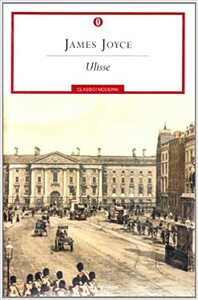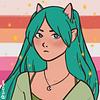Take a photo of a barcode or cover
I can’t say I fully understood what in the world was going on with this book. It was interesting. The author used lots of different styles and also seemed to use no style at all. I feel like it had something to do with how people perceive themselves in the world, and their hopes for how others see them.
I first read this book because I was told it couldn't be done. Only years later did I appreciate the music that James Joyce weaves with words. An all time favourite. The Molly Bloom soliloquy....
I get its significance. I can see what was new and exciting about it. But when it comes down to it, I just don't like this book.
Finished. I know there are already a million reviews so why bother… but I’ll bother anyway. Did I love every minute of reading this? No. Do I appreciate its greatness? Yes.
I equate this book to going into an overwhelmingly large museum, a place like the Louvre, each room is filled with glorious art, some that speaks to me some that doesn’t. The sheer variation of human ability to create on display, beauty, skill, creativity… but in Ulysses the simple fact that all that variation and art has come from one mind is the magic.
For me the rooms I relished most: Proteus, Sirens, Nausicaa, Ithaca
I equate this book to going into an overwhelmingly large museum, a place like the Louvre, each room is filled with glorious art, some that speaks to me some that doesn’t. The sheer variation of human ability to create on display, beauty, skill, creativity… but in Ulysses the simple fact that all that variation and art has come from one mind is the magic.
For me the rooms I relished most: Proteus, Sirens, Nausicaa, Ithaca
challenging
reflective
slow-paced
Plot or Character Driven:
Character
Strong character development:
No
Loveable characters:
No
Diverse cast of characters:
No
Flaws of characters a main focus:
Yes
“There’s no one as blind as the fellow who won’t see”
Joyce’s ‘Ulysses’ is an epic narrative of the journey of Leopold Bloom across his day in Dublin. It parallels the events of Odysseus’ homecoming in ‘The Odyssey’, each episode representing a segment of his journey. On the one hand this was really clever, full of subtle allusions which I appreciated once I clocked onto them, though on the other hand a fair few of these allusions I had to chase up analysis’ of and given how obscure and loosely ties they were in some cases that perhaps takes away from them being particularly impressive as generally they were difficult to pick up and understand.
A lack of understanding was a common trend in ‘Ulysses’. I would describe most of this novel as simply ‘words’. So much of it was just stream of consciousness lists and playing with the narrative format, imitating other authors or switching to script in parts, but ultimately most of it was just incomprehensible lists and extremely specific descriptions that confused the narrative and made it feel less of a story and more just - words. That being said Joyce was clearly extremely well read and educated, his work is full of philosophy and literary allusions which in the cases that I picked up on and understood made parts of the book very rewarding. I read that ‘Ulysses’ is a testament to how well read you are as a reader dependent on how much you pick up, and in each reread you will learn more and more about yourself and see how far your own personal reading journey has come, and I would be inclined to agree; though it will be a very long time until I can see myself ever having the enthusiasm to try and pick this up again.
I liked the relationship between Bloom and Stephen Daedalus, as morally questionable as they are presented to be it was sweet in places, especially in the Homeric homecoming during the ‘Nostos’ third of the narrative. I didn’t as much enjoy the extremely sexualised relationships between couples and flings throughout though, Joyce is very specific in his depictions of these scenes and the ‘Roman Candle’ episode which I had read an excerpt from for uni a few years ago was not an enjoyable experience to revisit. After all, Bloomsday is an anniversary of Joyce’s first sexual encounter with his wife-to-be so what more can be expected.
As it stands, for the better or the worse, ‘Ulysses’ was an extremely tricky read and I can’t say I enjoyed it very much, but know I will be glad of myself for reading it when I am scurrying around Dublin and able to recognise the locations in a few months.
If you find yourself with as much time as James Joyce had to write this book, use it for somthing more productive than reading it because you will loose the will to read.
The things you do for completing a 100 Book scatch map
The things you do for completing a 100 Book scatch map
I read it as a challenge, and it was certainly challenging. There’s a lot of fascinating poetry in the various uses of language, but the exhaustive examination of every minor avenue of investigation got wearying. Maybe I’ll try it again in a few years.
I thought I’d find something profound there but it was only just a different way of writing than was previously seen at the time. Toooo much preoccupation with penises and ladies’ feet. Too many instances of white male ideology. Loquacious drivel from under-developed man-babies attempting to express their impotence at being emotionally repressed in their stifling Victorian era. Yes, I comprehend that their incessant Hamlet rants and all of the queer innuendo are very much a product of that time period. No, I don’t think being able to capture the way humans think on paper is particularly poignant at all. Almost 30 hours of chittering children complaining about how the world has done them wrong because they are male, being baffled about “The Great Feminine Mystique,” and shaming themselves continuously for failing their dead mothers...if I craved any of these things I’d just hang out with my tweenie son and his friends for a day and a half. At least they don’t feign erudition. DNF @ 12 hours (yes, I know this is considered white patriarchy cannon, but clearly it is not for everyone).
Lots and lots I didn't understand, but wordplays and insights and jokes and general hilarity and wisdom enough to last a lifetime, so I'm very very happy that I kept going till the not-so-bitter end. I simply loved the last chapter.
Review (not of the book, of the reading experience!) in Danish on my blog: http://labeet.dk/litteratur/ulysses/
Review (not of the book, of the reading experience!) in Danish on my blog: http://labeet.dk/litteratur/ulysses/
Trying to review in a paragraph or two, a book which I could study for years without running out of things to say, might be a difficult task. It is of course everything that is said about it: genius, turgid, ridiculous, sublime, difficult, poetic, profound, bizarre, irreverent, etc. - it's hard to disagree even with things said by those who hated it while maintaining that I loved it. One element I was surprised by was how funny it is, I remember Dubliners being occasionally funny but I found this regularly hilarious and I'm not sure that is mentioned enough in its praise.
Above all, my main takeaway is: god I'm glad I'm reading this in the 21st century with the internet in my pocket. I feel the need to understand everything as I read so if I were trying to read at the time of publication I'd have needed to do so in a library well stocked with perhaps a dozen different language dictionaries and encyclopedias on everything but especially Irish history, greek mythology, Victorian parlour music, Judaism, and so on...
There's an arrogance to writing a book as long as this and expecting people not to lose interest, meaning I start long books with a bit of resentment already brewing and need to be won round. But having loved his previous two novels meant Joyce had a bit of credit in the bank and I was quickly on side. It's the longest book I've ever read and it took forever, but I already miss it and was almost itching to start again. Hard to spend nearly nine weeks in the minds of a few characters without a feeling of grief at the final separation.
Above all, my main takeaway is: god I'm glad I'm reading this in the 21st century with the internet in my pocket. I feel the need to understand everything as I read so if I were trying to read at the time of publication I'd have needed to do so in a library well stocked with perhaps a dozen different language dictionaries and encyclopedias on everything but especially Irish history, greek mythology, Victorian parlour music, Judaism, and so on...
There's an arrogance to writing a book as long as this and expecting people not to lose interest, meaning I start long books with a bit of resentment already brewing and need to be won round. But having loved his previous two novels meant Joyce had a bit of credit in the bank and I was quickly on side. It's the longest book I've ever read and it took forever, but I already miss it and was almost itching to start again. Hard to spend nearly nine weeks in the minds of a few characters without a feeling of grief at the final separation.







